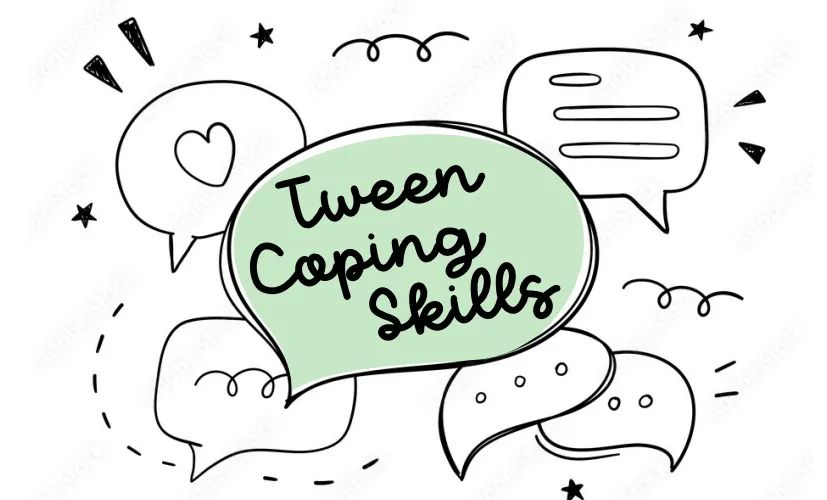

Tween Coping Skills
May 2022
by Kelly McCandless
Kids in middle school are generally going through an awkward time. That tween phase is tough, and today’s environment makes it even harder.
Regardless of the home environment, school mental health professionals report seeing higher levels of depression and anxiety and increasing numbers of kids diagnosed with significant mood and behavioral regulation issues. While these issues have always existed, the current atmosphere with things like the pandemic, politics, higher pressure for achievement, technology, and so much more create a perfect storm.
Major Issues Facing Tweens
Amber Ault is one of two School Counselors for Ben Steele Middle School, charged not only with guiding students through their educational options, but also with supporting mental, behavioral, and social/emotional health issues. She says, “There’s a lot more anxiety for kids because of the unknown and unpredictability present in today’s world.” Ault explains how tweens are in tune with politics and the issues swirling around them, and that the year of remote learning helped create a starker division between kids.
The pandemic and politics are icing on top of an already complex cake. “One big thing I see is that the phone becomes a coping mechanism for these kids,” Ault explains. “They may not know how to have a conversation face to face or deal with stress because they use their phones to escape.” And, developmentally, this age student is very likely to do things digitally they wouldn’t say and do in person. “We deal with digital and phone issues daily,” Ault continues. “Kids are sharing horrible things targeting other students, which makes them feel powerful and like they have control and can stand out among their peers.” The pressure all around can get very heavy.
How Our Schools Respond
Hailey Gray, SSP, NCSP, is one of ten School Psychologists for School District 2. She works with Newman and Boulder Elementary Schools and Lewis and Clark Middle School.
“The role of schools over the last 10-15 years has expanded far beyond reading, writing, and arithmetic,” Gray explains. “We provide clothes, food, safety, even health care through basic medical, dental, and eye care clinics in some of our schools. We are a one-stop shop for both education and social needs.”
As the largest district in the state, School District 2 has more resources than some other education systems. Several Billings public schools have social workers who help connect students with services, and all schools have counselors who support basic mental health concerns.
Despite that, it’s simply not enough. “There will never be enough because mental health is complex and challenging,” Gray says. She continues by explaining that teachers are expected to be the first line of mental health defense, despite everything else on their plates and whether they’re equipped to deal with the issues or not. “They see so much more than gossip and bullying. Kids dealing with serious problems with major needs. The school is the first place expected to step in and offer support, and oftentimes the first to point out significant issues.”
What This Means for Families
One thing both Ault and Gray say can make a major difference: all children need at least one caring, stable, reliable, engaged adult to connect with. That person can be a teacher, a coach, a parent or guardian, or anyone who meets the criteria and makes the child feel safe. That kind of connection can help clarify a stable path forward even in the face of continuing hardship.
What else can parents and guardians do to help their tweens? “Kids have difficulty with social interaction and coping skills, often due to their reliance on technology,” Gray explains. Working with tweens on developing safe coping skills and guiding their social maturity outside of their phone are critical for their development. “We help them by pushing lessons in the classroom to review what these behaviors looks like,” notes Ault, “But support outside of school makes all the difference.”
Skills like these are missing oftentimes because the adults in their life don’t know or use them either. Families can help each other by putting away the tech and trying skills like deep breathing, acknowledging stress, and creating safe spaces for big emotions.
6 Tips to Build Your Tween’s Coping Skills
Help your tween feel better able to cope with their emotions with these tips and tricks:
1. Validate Feelings: If your tween is feeling big emotions, make sure they know it’s ok to feel mad, sad, frustrated, etc. Even if they seem irrational, let them go through their emotions.
2. Listen and Reflect: Let your tween tell you about what they’re experiencing, and when they’re finished, summarize it and reflect what they said back to them. Summarizing can be powerful to the person you do it for to help them gain perspective.
3. Deep Breathing: Remind your tween to stop and take a deep breath or two. Not only will the oxygen help the brain regain control, but a few deep breaths create the perfect pause when big emotions are at work.
4. Grounding: Encourage your tween to take a time out! A good one, though. Have your child take a break by stepping into the hall or the bathroom. Grounding involves observation through senses. Wherever they are they ask themselves, “What do I see? What do I hear? What can I smell?” Taking a moment to make these observations can help them cope with big emotions.
5. Ice Water: This is the easiest of all. Taking a drink of ice-cold water can make a huge impact when feeling overwhelmed, stressed and anxious. Fill ‘er up and allow yourself to slow down while the ice water helps bring your brain back to baseline.
6. Ask specific questions: Get past the “good” after school each day by engaging your tween with a real question. Instead of “How was your day?” Ask who they sat by at lunch? What did they read about in science? Not only will questions like this help get better conversation flowing, but your tween is likely to feel engaged and encouraged to continue talking.
Thanks to Samantha Larson, LCSW, with Empowering Connections MT for providing these tips. Learn more about her at https://www.facebook.com/empoweringconnectionsmt/.
Originally printed in the May 2022 issue of Simply Local Magazine
Never miss an issue, check out SLM's digital editions here!





